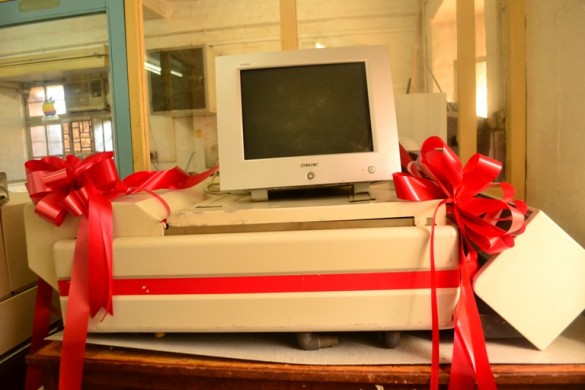The Makerere University Printery has received a film processing machine worth UGX.150 million from Mr. Hasan Mumtaz, a big-hearted individual inspired by Makerere University’s contribution to the generation of knowledge, advancement of professions and the transformation of Uganda and the world at large.
On Wednesday 27th May 2015, the cheerful giver, Mr. Hasan Mumtaz confessed his everlasting love for Makerere University to Mr. Joseph Kirabo, the Manager-Makerere University Printery and Ms Ritah Namisango, Senior Public Relations Officer of Makerere University.
“I love Makerere University. My heart is always here. I love people who read and teach. I love the fact that the institution is full of intellectuals and bright people who make a contribution to training and polishing people serving Uganda and the world!” 
Meeting the Board of Trustees of the Makerere University Endowment Fund and staff from Mak Planning and Development Department, the enthusiastic Mr. Hasan Mumtaz captivated the audience when he shared his emotional attachment to the great works of men and women serving this institution, referred to Makerere University staff as prophets, and appreciated the impact of their work through diffusion of knowledge to humanity.
Mr. Mumtaz said: “I feel honoured to be here. You are a photocopy of our prophets from Moses to Mohammed. They all came to teach and they are respected. Teaching is a noble profession. I love people who read and teach. You may not be getting good income, but this is a noble profession.”
“Makerere University is a factory producing high quality intellectuals and professionals for the country and the world at large. I respect teachers. I decided something valuable to give to Makerere University. You need equipment to teach people and produce more intellectuals and professionals,” remarked Mr. Mumtaz amidst applause from a captivated audience.
The Manager, Makerere University Printery, Mr. Joseph Kirabo applauded Mr. Hasan Mumtaz for a donation that would add value to their production processes. The X700 Digital colour press will be used to output film for colour printing which the university has been lacking for the last 20 years.
“We have written several proposals requesting for support aimed at enhancing the performance of the Makerere University Printery. We needed a film processing machine. We have been spending approximately UGX.45 million annually to outsource this service. We will therefore remain eternally grateful to Mr. Hasan Mumtaz for this donation,” said Mr. Kirabo.
“In addition to the savings we expect to earn upon reducing the printing expenses, we will also add value to our production process in terms of enhanced quality and timely deliveries,” he added.
The Chairperson of the Makerere University Endowment Fund, Dr. Martin Aliker thanked Mr. Hasan Mumtaz for being big-hearted and donating valuable equipment to Makerere University. Dr. Aliker equally thanked Mr. Shahid M. Alvi, the Chairman of the Pakistan Society in Uganda for accompanying the cheerful giver to Makerere University.
“We are really grateful for your contribution towards the development of the Makerere University Printery. As the Makerere University Endowment Fund, our major role is mobilise resources both in cash and in-kind to build and develop the institution. Therefore, the machine you have donated to us today is now part of the institutional resources,” he said.
Dr. Aliker also urged other individuals, organisations and well-wishers to emulate Mr. Hasan Mumtaz’s generosity in supporting and developing the University.
“We are also mobilising funds to build the Makerere University Students Centre; a multi-facility for students as they per take their studies. We are open to receive resources in cash and/or in-kind that will add value to Makerere University. Our primary function is the welfare of the students. We appeal to the Pakistan community to interact with the Makerere University Endowment Fund for the betterment of the University,” he said.
The Head-Secretariat, Makerere University Endowment Fund, Dr. Fl orence Nakayiwa thanked the members of the Board present namely Ambassador Edith Ssempala, Mr. Martin Owiny, Mr. Grace Isabirye for witnessing the handover ceremony. Dr. Nakayiwa reiterated the fact that the Makerere University Endowment Fund has extended several requests to individuals and organisations that were being followed up.
orence Nakayiwa thanked the members of the Board present namely Ambassador Edith Ssempala, Mr. Martin Owiny, Mr. Grace Isabirye for witnessing the handover ceremony. Dr. Nakayiwa reiterated the fact that the Makerere University Endowment Fund has extended several requests to individuals and organisations that were being followed up.
“We are optimistic that the proposals will bear fruit. I congratulate the Makerere University Printery upon receiving this film processing machine. I commend Mr. Hasan Mumtaz for his generosity, and we look forward to more interactions with you and the Pakistan Community at large,” remarked Dr. Nakayiwa, who is also the Director, Planning and Development Department at Makerere University.
Mr. Hassan Mumtaz is a Ugandan of Pakistan origin. He came to Uganda in 1983. He has educated some of his children on this great Hill of Makerere University. According to him, one of the children –Aisha Hassan studied Communication at Makerere University up to second year thereafter was admitted to study in UK.
Story by: Ritah Namisango and Prossy Nabatte

 General2 weeks ago
General2 weeks ago
 Agriculture & Environment2 weeks ago
Agriculture & Environment2 weeks ago
 General1 week ago
General1 week ago
 Health2 weeks ago
Health2 weeks ago
 Research2 weeks ago
Research2 weeks ago



